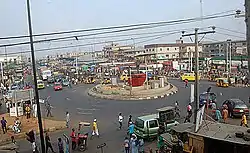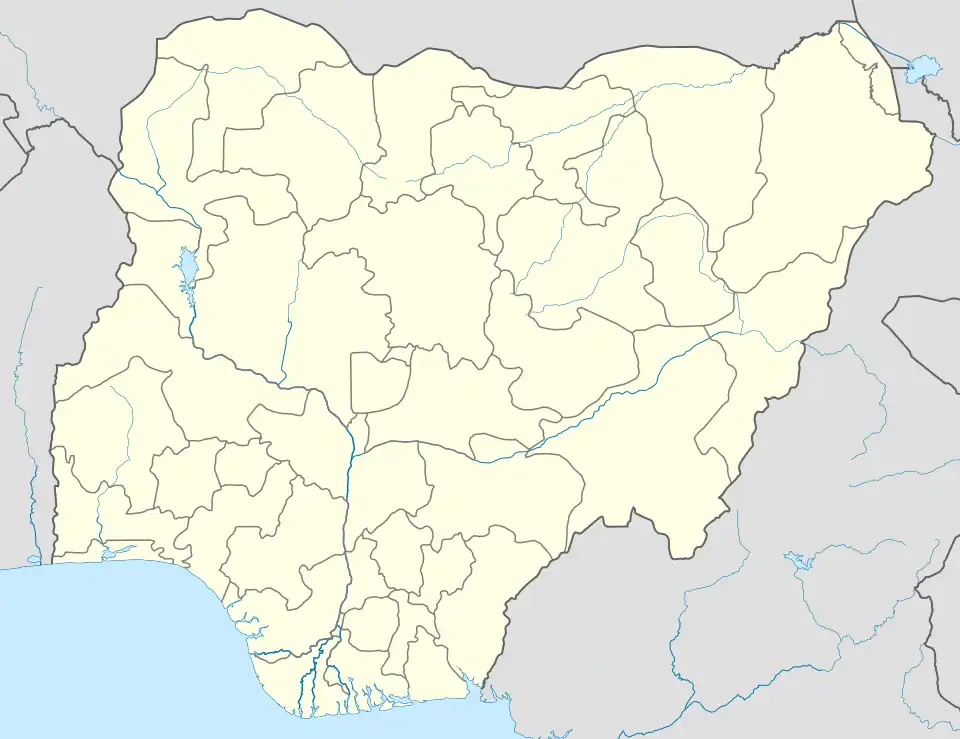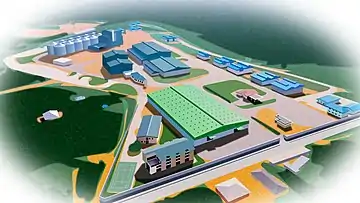Ikorodu
Ikorodu is a city in Lagos State, Nigeria.[1] It is located to the north-east of Lagos, along the Lagos Lagoon and shares boundary with Ogun State. With a population of over 1million inhabitant, Ikorodu is currently the 12 largest city in Nigeria and growing at a rate of 5.26% annually, it is projected to reach 1.7 million inhabitant by 2035,[2][3] It is the largest local government in Lagos State. Indigenous settlers of Ikorodu emigrated from Sagamu in Ogun state.[4]
Ikorodu | |
|---|---|
Municipality | |
| Ikorodu Local Government Area | |
 Downtown Ikorodu | |
_%252C_Estado_de_Lagos.PNG.webp) Ikorodu Shown within the State of Lagos | |
 Ikorodu | |
| Coordinates: 6°36′N 3°30′E | |
| Country | |
| State | Lagos State |
| LGA(s) | Ikorodu |
| Government | |
| • LGA Chairman | Wasiu Adeshina |
| Area | |
| • Land | 345 km2 (133 sq mi) |
| Population (2006) | |
| • Total | 536,619 |
| Time zone | UTC+1 (WAT) |
| National language | Yorùbá |
Geography and economy
Situated approximately 37 km north of Lagos, Ikorodu is bounded to the south by the Lagos Lagoon, to the north by a boundary with Ogun State, and to the east by a boundary with Agbowa-Ikosi, a town in Epe Division of Lagos State. The town has grown significantly in the past 40 years and is divided into sixteen or seventeen "Ituns" or minor areas. The main industries in the town are trading, farming and manufacturing. Ijebu dialect is widely spoken in ikorodu.
Nearby major towns include Imota, Isiu, Liadi, Egbin, Ijede, Igbogbo and Bayeku, all of which constitute their own Local Council Development Area with their own traditional rulers (Obas). Together these areas make up Ikorodu Division.
Ikorodu Division has a large industrial area containing several factories. The town of Ikorodu itself is home to branches of several established Nigerian banks.
Ikorodu is the fastest growing part-exurb of Lagos metropolis, owing in part to increasing influx of people from Ikorodu's surrounding towns and villages attracted by the town's proximity to Lagos.
In 2003, the existing Ikorodu LGAs was split for administrative purposes into Local Council Development Areas. These lower-tier administrative units now number 6: Imota, Igbogbo/Bayeku, Ijede, Ikorodu North, Ikorodu West, Ikorodu.[5]
Economy
Imota rice mill

The Imota rice mill is an agricultural plant. It was built in 2021 and will commence full production in the second quarter of 2022.[6][7]
Capacity
The rice mill has a capacity to produce 2.8 million bags of 50 kg bags of rice yearly, while generating 1,500 direct jobs and 254,000 indirect jobs. On completion, in line with the estimated installed infrastructure of the facility, the production capacity of the rice mill in Imota will set it among the largest in the world, and the largest in sub-Saharan Africa.[8]
Economic effect
According to Lagos State governor Sanwo-Olu, full production of the facility will drastically reduce prices of rice and pressure to purchase the commodity.[9] At this moment (early 2022) Nigeria produces husk rice, yet imports hulled/polished rice at a higher price.[10] Processing the national staple food rice in its own country therefore should improve Nigeria's trade balance.
Technical process
In a rice mill, primarily the cereals spelt, barley, oats, millet and rice are hulled, i.e. the husks that are firmly attached to the grain and do not fall off during threshing are removed (dehusking). The husks are indigestible for the human organism and would negatively influence the taste and chewing sensations. Furthermore, in a rice mill, the hulled cereal grains are usually also subsequently rolled (oat flakes), cut (groats) or polished (rice, rolled barley). Other possible processing steps are mostly identical to those in a grain mill.
Surroundings
The State Government is also developing an industrial park adjacent to the mill. Governor Sanwo-Olu said the park would have amenities that would make businesses thrive and bring returns on investment to business owners.
Religion
Inhabitants of Ikorodu include adherents to several religions, including Christianity, Islam, and traditional worship.
Education
Within greater Ikorodu there are 69 public primary schools and 12 secondary schools. There are also several private nurseries, primary and secondary schools, and two tertiary institutions.
These schools include:
- Caleb University, a private university located in the Imota area of the town, the first private university in Lagos.
- De-Multilaurel comprehensive college
- De-Young Comprehensive College, Aga
- Difas Schools Odogunyan
- Elepe Community Senior High School
- Goodswill Secondary School
- Goshen International School
- Government College Ikorodu
- Government Technical College
- Homat Group of Schools
- Ipakodo Grammar School
- Ikorodu Grammar School
- Ikorodu High School
- Lagos State Polytechnic Ikorodu.
- Lagos State Civil Service Model College, Igbogbo
- Linksbond College, Ikorodu
- Livingstone College, Ikorodu
- Odogunyan Secondary School, Odogunyan, Ikorodu
- Oreyo Senior Grammar School
- Oriwu Senior Model College
- Prev Academy, Ikorodu
- Royal Le Hope International School
- Sagab college, solomade Ikorodu
- Seatos Schools, Ikorodu
- Shams-El Deen Grammar School
- Stars International College, Ikorodu
- The Laurel Hall College, Ikorodu.
- The Saints International School, Isawo, Ikorodu
- Tindip schools
- Uncle Bayus Group of Schools
- United High School
- Yewa Grammar School, Aga-Ikorodu
- Top-ville college, Isawo, Ikorodu.
- Zumuratul islamiyyah senior grammar school
Ikorodu Divisional Library
There are several public libraries that are accessible to students, teachers, researchers and anyone who loves to read newspaper or any material of their choice.
- Ikorodu Town hall library located at T.O.S Benson Rd.
- Laspotech library.
Tourist centres
- Cradoo Lake Waterfront, Ipakodo and Ibeshe.
- Egbin Thermal Station, Egbin, largest thermal power facility in Africa [home to Lagos Independent Power Project].
- Ijede Warm Springs
- Ikorodu Lighter Port Terminal, lpakodo
- Iledi Oshugbo Abalaiye Ikorodu: sacred groove for the installation of Ikorodu Kings
- Lagos State Polytechnic, Odogunyan, Ikorodu
- Palace of the Ayangburen of Ikorodu.
- Voice of Nigeria [VON] Transmitting Station, Ikorodu[11]
References
- "NigeriaCongress.org". Archived from the original on 2004-01-09. Retrieved 2007-04-08.
- "The truth about living in Ikorodu". Retrieved 2022-09-29.
- "Ikorodu, Nigeria Population (2022) - Population Stat". populationstat.com. Retrieved 2022-09-29.
- "History - Ikorodu Progressives Association UK". Retrieved 2022-07-17.
- "Lagos State Government". Archived from the original on 2015-01-22. Retrieved 2017-10-04.
- "Imota rice mill to start production 2022 - Sanwo-Olu". 2021-12-10. Retrieved 2022-01-16.
- Online, Lagos Post (2022-01-02). "2022 Will Be A Season Of Consolidation, Sanwo-Olu Assures Lagosians | Lagos Post Online". Retrieved 2022-01-16.
- "Lagos multi-billion naira 32MT per hour rice mill to be completed by Q1 2021 - Nairametrics". 2020-12-29. Retrieved 2022-01-16.
- "Imota rice mill to start production 2022 - Sanwo-Olu". 2021-12-10. Retrieved 2022-01-16.
- Ajala, A. S.; Gana, A. (2015-10-26). "Analysis of Challenges Facing Rice Processing in Nigeria". Journal of Food Processing. 2015: e893673. doi:10.1155/2015/893673. ISSN 2356-7384.
- "About Lagos". Lagos State Government. Retrieved 2021-06-16.
